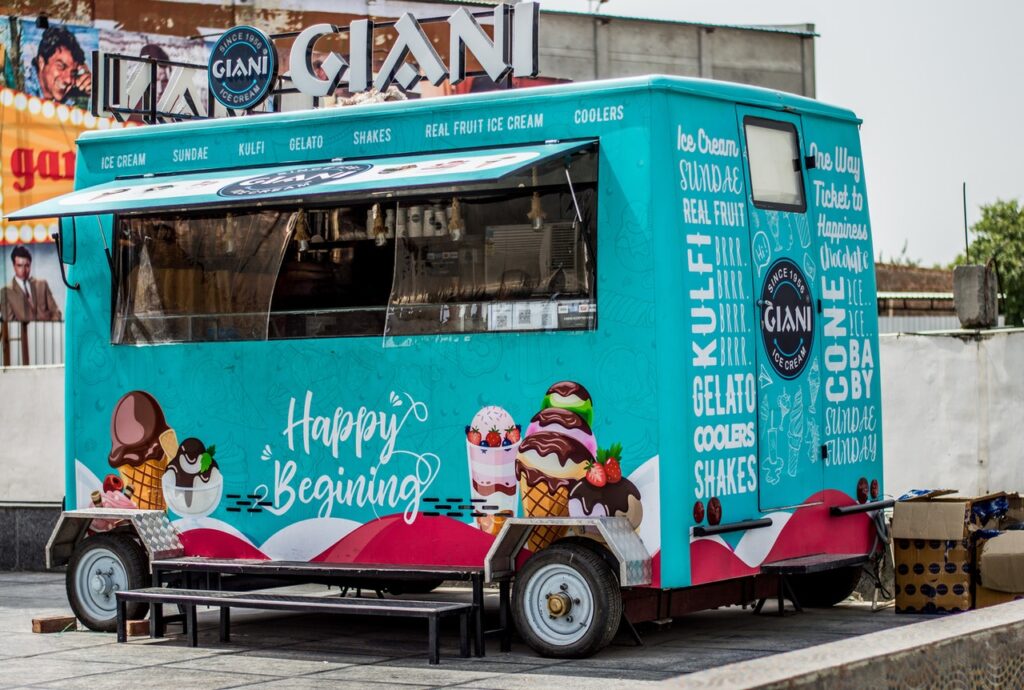
Starting and Running A Bakery (Complete Guide)
When it comes to favorite childhood memories, hearing the familiar jingle of an approaching ice cream truck has to rank among the most nostalgic. Few businesses bring more joy than an ice cream truck — quite literally! And if you’re interested in starting your own ice cream truck business, you’ll also be happy to know that the business is not only emotionally rewarding but financially profitable, too. However, there are a few things you should consider before starting your ice cream truck business to ensure that it’s successful.
In this guide, we’ll share tips on how to start and run a successful ice cream truck business.
Weighing the Pros and Cons of Starting an Ice Cream Truck Business
Before you decide if an ice cream truck business is right for you, let’s take a look at the top pros and cons you’ll encounter with this business.
Pros
- You’re Your Own Boss
When you operate an ice cream truck, you’re in charge. You decide when you operate, how you operate, and what you sell.
- Freedom
As an ice cream truck operator, you can experience true freedom. You can be creative in what you serve, how you design your truck, and even where you serve. You have the freedom to move to different locations whenever you choose.
- Earn a Lot of Money Each Day
You can easily pull in $200 or more in profit when you operate your ice cream truck. That’s not bad for a low maintenance business. On weekends and holidays, you may even get double or triple that amount, especially if you’re able to find a lucrative location. If you operate every day during the summer months, you can pull in an average of $20,000 for just 3 months’ worth of work.
- Lower Barrier For Entry
An ice cream truck is one of the easiest businesses to start as a complete novice. And it’s one of the most affordable. You can start your ice cream truck business for less than $10,000.
- Growth Potential
After one or two summers of getting the hang of operating your ice cream truck business, you can expand it. Eventually, you can have an entire fleet of trucks for your own unique brand.
- Easy To Get Customers
Who doesn’t love a cold treat on a hot day? You can attract customers without really trying because practically everyone loves cold dessert and is also familiar with how an ice cream truck works.
Cons
- It’s Seasonal
This can be viewed as both a pro and a con. However, it’s important to note that most ice cream truck businesses only operate in the summer months. You may be able to squeeze in 4-5 months, depending on your location, but most ice cream truck businesses operate from late May to late August/early September.
- Zoning Regulations
Some municipalities have restrictive zoning regulations that may make it difficult for you to set up shop in the location of your choice. And if you do, you could get fined. For example, some municipalities may restrict you from being in the same spot every day.
- The Music Can Be Annoying After A While
This may not be a big deal after a while, but it’s something you should consider. While others may only hear the fun jingle for a few minutes out of their day, you’ll hear it for hours each day. Eventually, you’ll learn to tune out the jingle, but until then, you may suffer.
- Ongoing Maintenance Costs
Even though an ice cream truck business has low overhead typically, there will be ongoing maintenance needs. And every vehicle will need a repair eventually. Be prepared for inevitable maintenance demands, especially if you’re buying a used vehicle. And remember that if your vehicle breaks down, you won’t be able to make any sales for the day. This can seriously eat away your profits.
- Small Work Space
If you’re prone to claustrophobia, this may not be the right move for you. When you operate an ice cream truck business, you’re in a confined space for hours each day. And while you can get outside and walk around, you can’t stray too far from your truck because you never know when you might miss out on business.
- Your Customers Can Be Immature
While everyone loves an ice cream truck, the majority of your customers will be children. You’ll need to be extra patient with children (especially if you want their return business) and be prepared to help them sort out their money, too.
Tips for Starting Your Ice Cream Truck Business
Here’s what you need to know to successfully begin your ice cream truck business:
1. Create a Plan
The first action step to building your ice cream truck business is to create a business plan. You need a business plan whether or not you plan to get outside funding for your ice cream truck business. However, if you do plan to secure funding, you’ll need to show lenders and investors how you’ll pay them back, and your business plan will help with that.
Your business plan will act as a map to guide you to profitability.
Creating a business plan is simple and can be done in less than an hour. First, outline your market (i.e. which areas you plan to target). Next, create a plan for profitability (i.e. explain specifically how you plan to make money). Third, identify your unique value (i.e. what sets you apart from others) as well as your weaknesses and areas for improvement.
2. Buy a Truck
The next step is to buy or lease a truck for your ice cream business. A used truck costs $10,000 and up. However, you can also lease a truck, which may be the better option if you’re not sure whether you’d like to commit fully to this business. Leases typically start at $2,000 a month, but the price varies on location and demand.
If purchasing a vehicle, be sure to thoroughly inspect it. Start with its cleanliness. If the vehicle isn’t clean, that may be the tip of the iceberg. Ideally, you want to find a vehicle that has been well-maintained.
3. Get Licensed and Insured
At minimum, you’ll need a driver’s license in order to operate a moving ice cream truck business. And fortunately, most ice cream trucks can be operated without a commercial driver’s license. However, if your ice cream truck weighs over 26,001 pounds, you may be required to obtain a commercial license in order to operate it.
In addition to a driver’s license, you may also need the following:
- Business license
- Permits (including health, resale, and peddler’s)
- Insurance (commercial auto insurance, product liability, and unemployment and worker’s compensation if you plan to hire help)
4. Know Your Local Regulations
In addition to getting licensed and permitted, you may also need to obey additional regulations, such as outfitting your vehicle with flashing lights or “Caution: Children” warning signs. You may also need to provide hand sanitation. Check with your city to know what’s necessary.
5. Decide on a Menu
What products will you sell from your ice cream truck? Pre-packaged ice cream treats? Soft serve cones? Some other specialty? Do your research to find out what are the best selling frozen treats in your area. You can do this by asking vendors what their best sellers are. You can also learn from experience.
For these reasons, avoid overspending on your products until you know what sells. Spend less than $500 in inventory to start. Then, once you identify your best sellers and your duds, you can buy more of what sells.
6. Buy Your Equipment and Inventory
In addition to purchasing or leasing a truck, you’ll also need to buy inventory and equipment. This includes the following:
- Freezer
- Generator
- Inverter
- Paper products (napkins, utensils, cone wrappers, etc.)
- Ice cream and other desserts
- Dry ice
7. Remember Other Costs
The beauty of an ice cream truck is that you don’t have a ton of overhead. However, you will have operating expenses. Gas is definitely one of those operating expenses. You’ll need to spend a considerable amount of time driving around so factor in gas when counting your operating expenses. A fair estimate is $5 for every hour you operate. So, in an eight hour day, expect to spend around $40 in gas prices. Of course, gas prices fluctuate a lot and can often be higher around holidays, such as the Fourth of July.
8. Map Out Your Route
Do market research to decide what the best route is for your ice cream truck business. Focus on residential areas, specifically those with a lot of children. Also, be on the lookout for neighborhoods that may prohibit ice cream trucks.
Another option is to look for popular areas that may cater to tourists, such as local attractions and theme parks. While you may not be able to park directly on their property, you could secure an area across the street.
Also check for festivals, such as music or even food truck events, in your area. You may be able to get a spot and make a ton of money over the course of one weekend.
9. Get Inspected
In order to operate your truck legally, you’ll need two main inspections: a health inspection and a vehicle inspection. The health inspection ensures that you’re complying with local ordinances in the proper handling of food for the public. The vehicle inspection ensures that your truck is okay to drive and park legally. Obtain both of these before you make your first sale.
10. Be Consistent
Being inconsistent is one guaranteed way to frustrate and eventually lose your customers. Being inconsistent may mean not showing up at predictable times, at the same location, or having the same items in stock. You may like to mix it up, but if your customers don’t like the mix, they’ll likely stop coming to your truck, even when they hear the jingle.
To avoid this, make sure to arrive at set times to your specific locations. Also, create a website that explains when you’ll be wherever you promise to be.
11. Set Up Your Payment Process
Keeping track of your money is an essential part of running a successful business. Not only do you need to have an accounting system in place, but you should also have a way to collect and process payments. Fortunately, we’ve moved beyond the days of old school cash registers or cash boxes. Instead, you can handle everything from collecting payments to accepting online orders directly from your point of sale (POS) device.
Here at Truffle POS, we offer an all-in-one, cloud-based POS system that enables food truck business owners to handle all management tasks, including:
- Inventory management
- Waste tracking
- Self-service ordering
- Customer loyalty
A customer loyalty program is particularly important for ice cream truck businesses. By creating a loyalty program, you can incentivize your customers to keep coming back all summer long and remember you for next summer, too.
We also offer location-based marketing to help you customize your outreach to customers based on their location. For example, if you switch areas daily, then you can notify your customers when you’ll next be in the area.
Learn more about how Truffle POS can help your ice cream food truck here.
12. Market Your Ice Cream Truck Business
The final step in setting up your ice cream truck business is to market yourself. While that familiar ice cream truck jingle will go a long way, you do need to diversify your marketing strategy. That will include the following:
Setting up a website – Use your website to provide contact information, interesting tidbits about your business, and, perhaps most importantly, details on where customers can find you next.
Claiming your Google Business Profile – Your Google Business Profile is a free listing that you can get from Google. By claiming this listing, you’ll show up in the Google search results when people search for “ice cream trucks” or “ice cream.” Also claim your spot on other review platforms, like Yelp.
Get active on social media – People will use social media to find you, so set up on the most popular platforms, such as Facebook, Instagram, and Tiktok.
Pass out flyers – Go old school with your marketing and pass out flyers. Be sure to add your locations and associated hours to ensure that you don’t miss a customer.
Final Thoughts
If you’re looking for a beginner-friendly business that has great hours and low overhead, an ice cream truck business is a great pick. But, as is true for any other business, running a successful ice cream truck requires careful planning and consistency. Use the above tips to guide you as you start your ice cream truck business.





